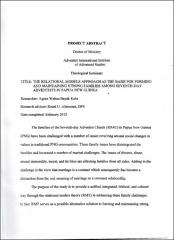The relational models approach as the basis for forming and maintaining strong families among Seventh-day Adventists in Papua New Guinea
Abstract
The families of the Seventh-day Adventist Church (SDAC) in Papua New Guinea
(PNG) have been challenged with a number of issues revolving around social changes in
values in traditional PNG communities. These family issues have disintegrated the
families and increased the number of marital challenges. The issues of divorce, abuse,
sexual immorality, incest, and its likes are affecting families from all sides. Adding to the
challenge is the view that marriage is a contract which consequently has become a
distraction from the real meaning of marriage as a covenant relationship.
The purpose of the study is to provide a unified, integrated, biblical, and cultural
way through the relational models theory (RMT) in addressing these family challenges.
~ fact, RMT serves as a possible alternative solution to forming and maintaining strong
families in the SDACs in PNG because it is in line with biblical principles and is
applicable to the culture of PNG. Thus, this study ends with recommendations to use the
RMT to enhance family relationships in SDACs in PNG. It: is divided into five chapters
which include the introduction (Chapter 1), the biblical background (Chapter 2), the
theoretical foundation (Chapter 3), the cultural background and context of PNG (Chapter
4), and the findings, conclusion, and recommendations (Chapter 5).
This study is based on personal observations and documentary research. It is not
exegetical but secondary in nature, therefore, it uses only selected biblical, theological,
and theoretical literature. It is limited to the description of principles only and not to
the intervention and development programs.
Moreover, in examining the biblical principles, RMT, and cultural themes of
marriage and family, an approach is identified as follows: (a.) nurture families, pastors,
and church leaders; (b) mentor families and young people; and ( c) train families as
missionaries. Thus, the study concludes with a need to embrace the Trinitarian covenantal
principles of relationship which is the ideal model for a covenant-based relationship. The
study also conveys the need to create a faith community for providing care and help to
families, thus, fulfilling the mission of God and ultimately preparing people for the soon
and imminent return of our Lord and Savior Jesus Christ.


